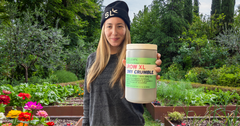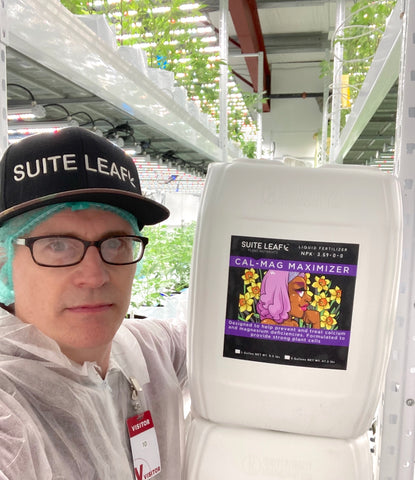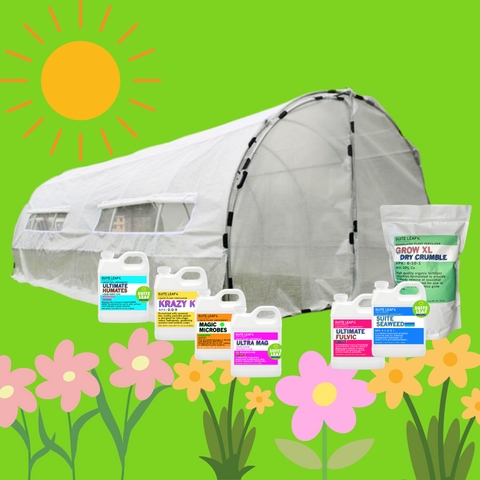
The Grower's Debate: Should I Use Organic or Synthetic Fertilizers in My Garden?
Gardeners and growers are not just cultivators of greens; they are custodians of the environment in microcosm. One key debate that has been fertilizing discussions (pun intended) is the use of organic versus synthetic fertilizers. This discourse isn't just about the health of the plants—it's about the health of the planet as well.
In this post, we will dig (pun also intended) into the characteristics, benefits, and potential drawbacks of organic and synthetic fertilizers. Whether you're a home grower with a 5 x 5 grow tent or tending to acres of vineyards or cannabis plants, this breakdown will help you make informed decisions about the best way to cultivate your garden while being mindful of the ecological footprint you leave behind.
Unearthing the Differences
Before we weigh the pros and cons, it's essential to understand the basic dissimilarities between organic and synthetic fertilizers.
Organic Fertilizers
Organic fertilizers are derived from animal or plant sources, which naturally contain the essential nutrients plants require. They can include anything from compost and manure to bone meal and seaweed, and they work with the soil, in a slower and more sustainable manner.

Pros of Organic Fertilizers
-
Eco-Friendly: They improve soil structure, increase water retention, and encourage microbial activity, maintaining the garden's health in balance with the local ecosystem.
-
Slow-Release Nutrients: Organic fertilizers provide a longer-lasting source of nutrients, which helps reduce the risk of over-fertilization.
-
Renewable: Made from sustainable resources, organic fertilizers support a circular economy and can be produced locally.
Cons of Organic Fertilizers
- Limited Nutrients: They can have lower concentrations of nutrients compared to synthetic counterparts, requiring larger quantities to achieve the same effect.
- Variable Composition: The exact nutrient content can vary, making it harder to achieve precise fertilization needs without extensive testing.
- Longer Breakdown Period: Organic materials take time to decompose, which means they might not provide immediate nutrient uptake by plants.
Synthetic Fertilizers
Synthetic fertilizers are manufactured using a mixture of chemical compounds. They are balanced and provide an immediate dose of essential nutrients to the plants.

Pros of Synthetic Fertilizers
-
Exact Nutrient Composition: Their chemical nature ensures that every nutrient your plant needs is delivered in the required balance, which can be critical in some crops.
-
Fast-Acting: Synthetic fertilizers’ quick dissolving compounds mean nutrients are immediately available, allowing for rapid growth responses from plants.
-
High Nutrient Concentration: They are more concentrated than organic fertilizers, meaning less volume is needed to achieve the same fertilization effect.
Cons of Synthetic Fertilizers
-
Environmental Impact: Runoff from synthetic fertilizers is a significant source of water pollution, leading to issues like algae blooms that can harm aquatic life.
-
Microbial Suppression: The dominance of synthetic fertilizers can lead to a decrease in the diversity and activity of beneficial soil microbes.
-
Short-Term Soil Health: They can contribute to soil degradation over time, decreasing fertility and decreasing organic matter levels.
Which Fertilizer Is Right for Your Garden?
The decision between organic and synthetic fertilizers is far from black and white; it should be as nuanced as the ecosystem you're a part of. Here are factors to consider when making this crucial decision for your garden, farm, or indoor hydroponic cultivation.
Are you a home gardener with a few pots on the balcony or grow tent, or do you manage a sprawling vineyard or farm? Your garden's size influences your fertilizer needs. Organic fertilizers, while beneficial in many ways, can become impractical for large-scale farming due to the quantities needed and the variability in nutrient composition.
Strains, Crop Type and Season
Crops have unique nutrient requirements, and these can change with the season. Some plants thrive with the slow, steady nutrition of organics, while the immediate boost from synthetics is best for others. Nutrient feeding can vary widely for cannabis plants depending on the strain.
Environmental Considerations
The environmental impact of your fertilizer choice is perhaps the most critical factor. Synthetic fertilizers often require more water to be effective and can lead to degradation of soil health over time. Organic options, on the other hand, create a more well-rounded ecosystem.
Intended Use
Are you growing for taste, for health, or for market? The answer to this question will affect your fertilizer of choice. Many advocates for organic produce cite enhanced taste and nutritional value, while others value the aesthetic quality and consistent appearance that synthetic fertilizers can provide. This can be especially important if you're seeking more bag-appeal" and product consistency for retail purposes.
Time and Budget
Using organic fertilizers often means being able to invest more time and resources into your gardening. You may have to maintain a compost pile, crop rotations, and other time-consuming but ultimately beneficial activities. Synthetic fertilizers can save time, but they come with greater budgetary demands due to their concentrated forms and potential need for more frequent applications.
Long-Term Goals
Is your goal a bountiful harvest for this season or to improve the health of the soil for future use? Organic fertilizers are a long-term investment in the health of both your plants and the environment, while synthetic fertilizers can provide short-term gains at the cost of future sustainability.
Crafting the Perfect Blend for Your Garden
In many gardening and farming scenarios, the best solution may not be an exclusive choice between organic or synthetic fertilizers but instead a blend of the two. For instance, using organic practices in combination with light synthetic supplementation could provide the best of both worlds.

Crop Rotation
Rotate your crops seasonally to improve soil fertility. Cover crops can be grown on otherwise fallow fields and then turned under to provide green manure, which is a classic organic fertilization practice.
Compost Tea and Manure
These traditional organic methods can be a superb additive to synthetic fertilizers. They can enhance soil structure and water retention while adding beneficial microorganisms to the mix.
Balanced and Slow-Release Synthetics
Utilize balanced and slow-release synthetic fertilizers in conjunction with organic amendments to moderate the release of nutrients and reduce the risk of leaching.
Balancing the use of these fertilizers is an art, and the right balance can only be found through experimentation and observation. It's vital to remember that your garden is unique, and its health depends on how well you as a gardener can orchestrate a melody between its requisites and growth. Only you can know the intricate ebb and flow of your patch of green, and only through taking an active role in cultivating it can you ensure that it grows in harmony with itself, and with nature.
Written by Jon Regan, Founder, Suite Leaf Plant Nutrients
Check out Suite Leaf's complete line of organic and hydroponic fertilizers HERE
